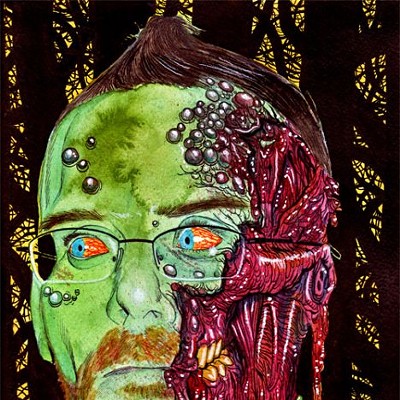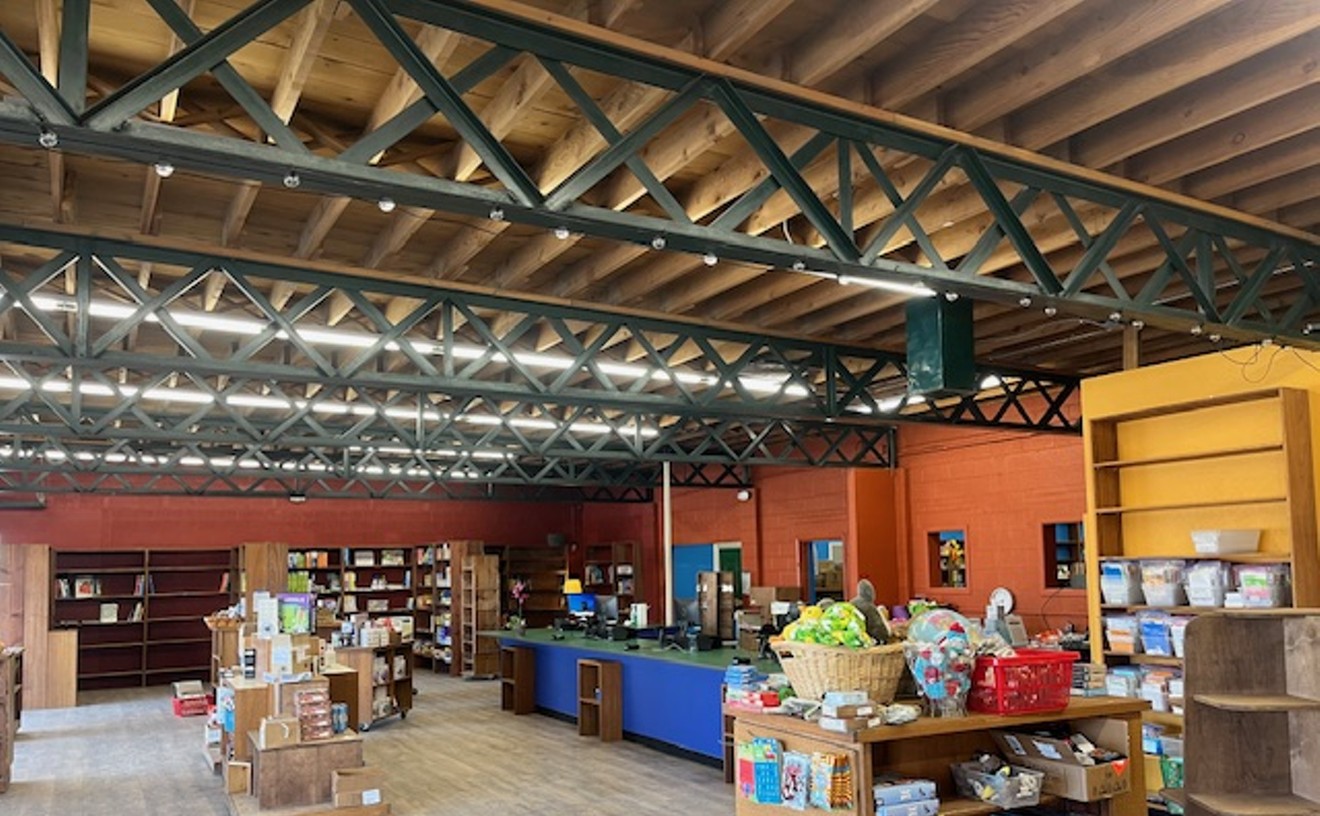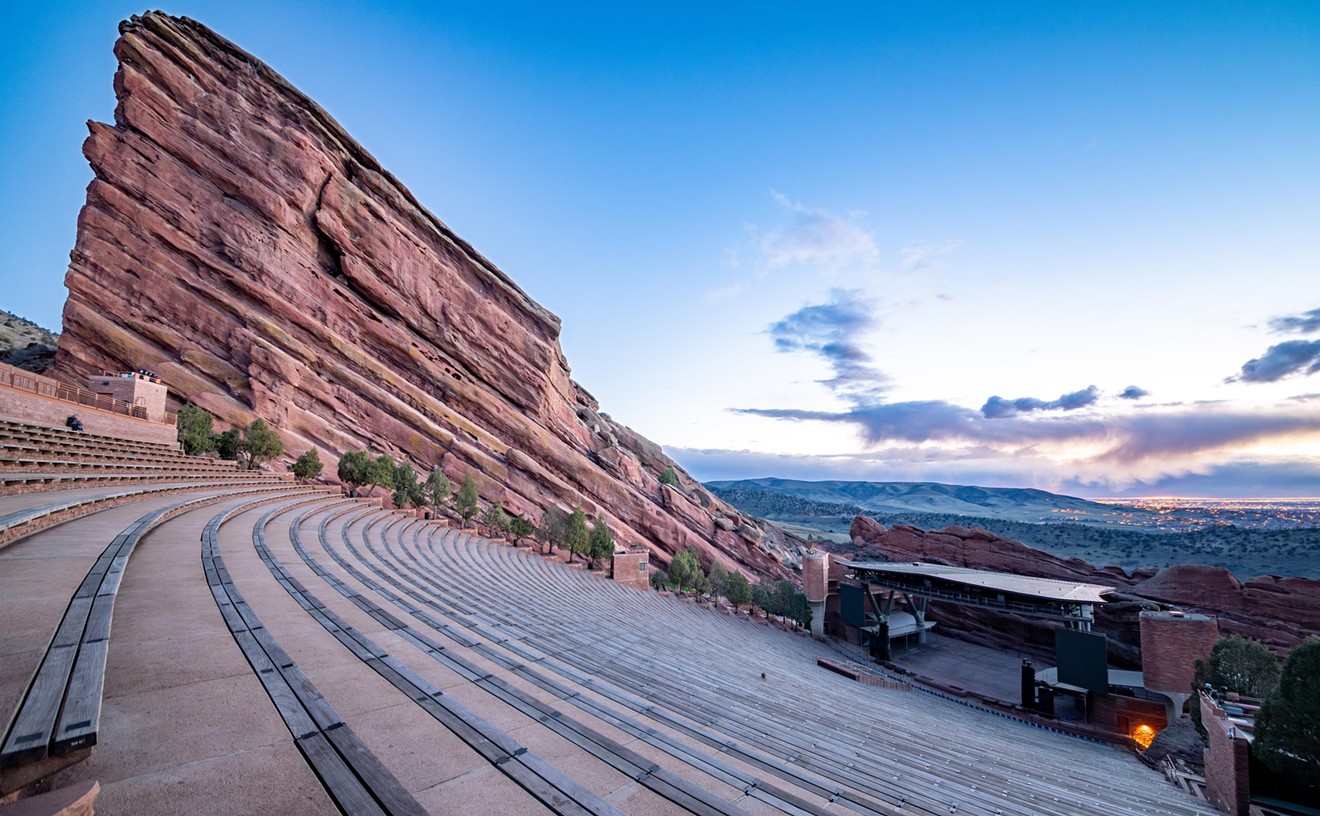See also: Nightmare lodgings: Five films that will make you want to stay home for the holidays
Westword: Are you a silent film aficionado?
Paul Buscarello: A budding one, maybe. I came to it because I went to the Silent Film Fest last year that Howie Moskowitz puts on at University of Colorado Denver. I liked it a lot. I'd seen a couple of silent films, but it was really something to see it with the live music, and that's very much how it's supposed to be watched. It's apparently a total abomination to watch it without any music at all, but definitely it was really exciting to see live performers and Hank Troy, who's from Boulder, does really good work. He improvises, kind of. That was exciting, so I started watching more silent films and then I figured, "Hey, it'd be cool if I performed my own soundtrack."
Why The Phantom Carriage? What drew you to that film in particular?
I was really looking for something for Halloween, and it's very dark. Nosferatu is another Halloween go-to, and this one just has more of this sort of human horror. It's about bitterness and nihilism and what happens when you let your hatred overwhelm you and regret and obsession. It's really dark. The filmmaker had sort of a Dickensian vision of this darkness and redemption, but I don't think it really redeems... I tried to echo [that] in the soundtrack with the theming. Maybe [the main character] has this spiritual renewal, but I think death is this force that is totally inescapable for these characters, for better or for worse. For him, for better, he sort of needs it to be redeemed at all.
I just think it's really spooky. The special effects are unbeatable. I think they're really perfect.
In the process of selecting this film, did you watch a lot of films before making your decision? Or did you say, "Holy shit, this is the one!" as soon as you saw this?
I wish I'd said "Holy shit!" when I saw this, because that would be more genuine. I was wanting to do a performance, but the second I saw the portion with the special effects I knew. It's just stunning how they created these double exposures and stuff like that. I wish it was the other way around, but I [initially] was just looking for a film to do the event.
What's your musical background?
I guess I'm a hobbyist. I played music for a long time, and I have sort of a multi-instrumental philosophy, which is a way of guarding myself from getting really good at one. I don't have as much commitment to virtuosity or anything like that. I get easily bored.
One of the problems of doing the soundtrack is I'm doing most of it on piano, and then the piano does some synthesizer stuff. I have a banjo and a mandolin and some other stuff, but it's mostly piano and I am not the best pianist. I'm not trained really in anything, so it was sort of, "How do I get what I want to play out there without showing the holes in my ability?" I'm not like Hank Troy or these people that do it professionally who are really good at just piano.
Did you incorporate any elements of the original score?
No, a lot of the silent movies either didn't have a score, or they sent out sheet music that quickly got lost. This one I just started from scratch. Most of the melodies are off of the melodies of Swedish folk tunes, because it's sort of a working man's story. Their idea of a folk song -- it's funny, you'll read the translation of the lyrics and it's about flowers and love and Jesus, but the melody is just dark and spooky. [Laughs] It sounds like it's out of the darkest of Chopin or sad piano themes. They were very easy to work into a horror film.
You also worked in some elements of classic horror scores, right?Yeah, that's what I was going for. When I watched the Criterion DVD of The Phantom Carriage, it has a really great soundtrack, but most soundtracks to silent horrors, when you get them at the Library of Congress or early DVD transfers, their idea of a soundtrack is just spooky noises. I really wanted people to have the experience of seeing a silent film, with melodies, and each character having a theme, stuff like that. I have a lot of sound effects and ambient synthesizers, but I really wanted to make sure there was a melody. I watched Halloween and Psycho and some of the more iconic soundtracks, and I wanted to plug into that. [John Carpenter] has some of these really simple melodies. That Halloween theme really sticks with you. It's perfect.
He was really good at getting a lot of mileage out of some pretty basic motifs. That's a big part of what makes them so recognizable, iconic even.
Exactly. I hope that I have something that will stand out. I only have the space of this film, and hopefully I want people to have the idea that, "Okay, this melody means this." That way I can do the work of the movie, the expectation and moving the plot in the musical way that movies do.
Are there other elements of the music you want to point out?
I really wanted it to be very modern -- there's electronic drums and a lot of different things going on -- but I really want that sort of old-timey, classic movie experience where you feel the presence of the piano player doing the accompaniment. I didn't want it to sound like a soundtrack that happens to be performed live, I wanted to have the feeling of the musician in the room.
This is your second time performing the piece for an audience. How was your first performance received?
It sold out, but I keep saying, "Well, people hadn't heard it yet." It was well received and nothing catastrophic happened with the sound or the film. I just think it's a great film, and really it's my job not to ruin it. It's such a good movie, both as a silent film and it hasn't really dated. The acting is a good mix of that old silent film acting that people nowadays consider more out there, and there's also these beats of this really subtle naturalism.
I think it was well received because I think it's a great movie. I think it's not only a good horror film, but I think it will be a good Christmastime film, because it has the darker notes of the season. Like I said, it's Dickensian, in that it's sort of like A Christmas Carol, only a much creepier version.
What are your future plans for the score? Are you planning to release it in some form? Will you be composing and performing scores for other films in the future?
I'll record it. The movie is public domain, so I will put it out there and people can pair it with the movie, since you can get it off the Library of Congress website. I'm hoping to do more scores. The Denver Film Society has been super-accommodating. Keith [Garcia] at the Alamo Drafthouse has also expressed interest in doing silent films down there. Howie Moskovitz doing the Silent Film Fest. Those new Hitchcock silents that they found ... if they came through town it would be a blast to do. There's so many opportunities. I think it would be a cool challenge to try a different genre.
Sounds like this has really resonated with you.
Yeah, yeah! It's worked out. I've played in bands before, but as a solo musician, I don't think I'm interesting enough to play solo, so to speak. Accompanying something has more interest to me. I can lock in the moods and themes and really something to think about. I really like the role of being supplementary and hopefully blending with the film to the point where it becomes invisible and is just part of the experience.
I don't have a lot of experience playing solo, live, apart from little piano things at social events. I'm not a front stage showman type, so this is exciting for me, to have people show up for the event but to be on the sidelines. That way if they don't like it, they can blame the filmmaker. He's long dead, anyway.
Follow @WestwordCulture











